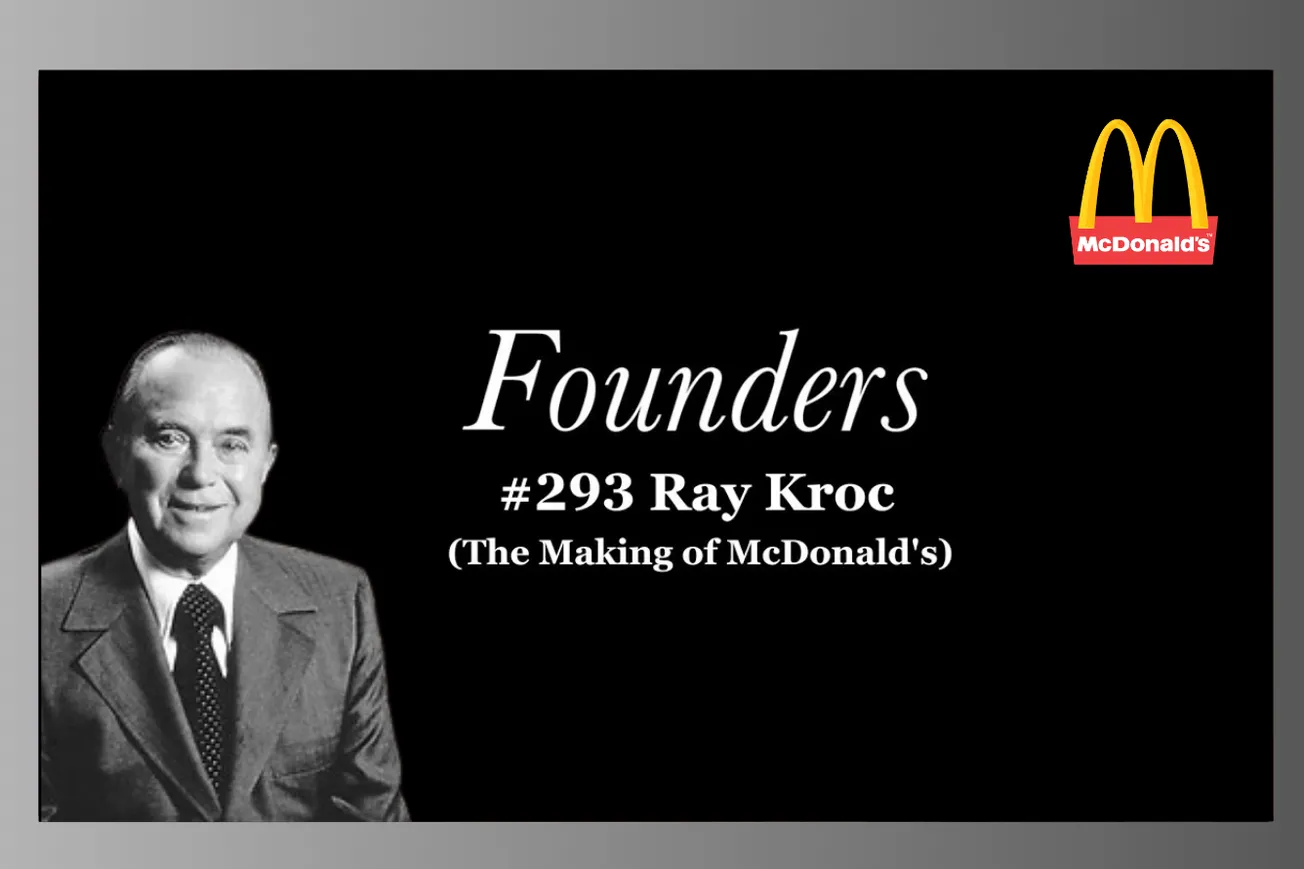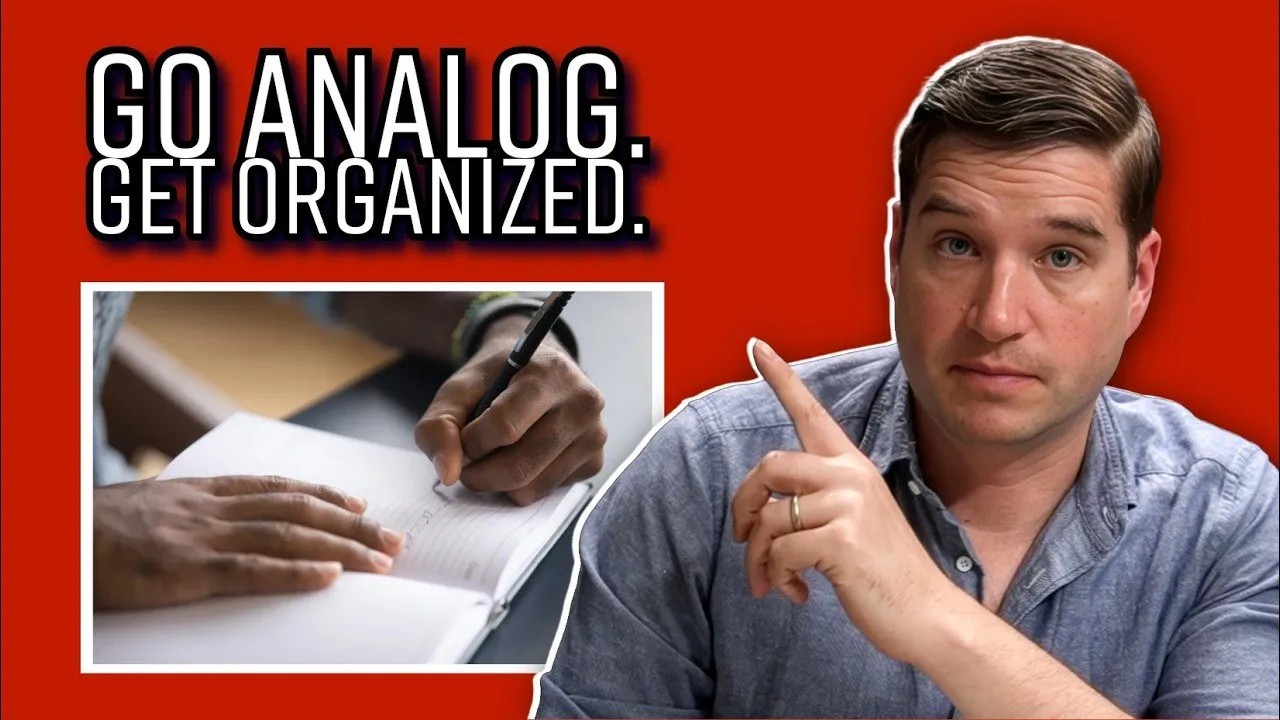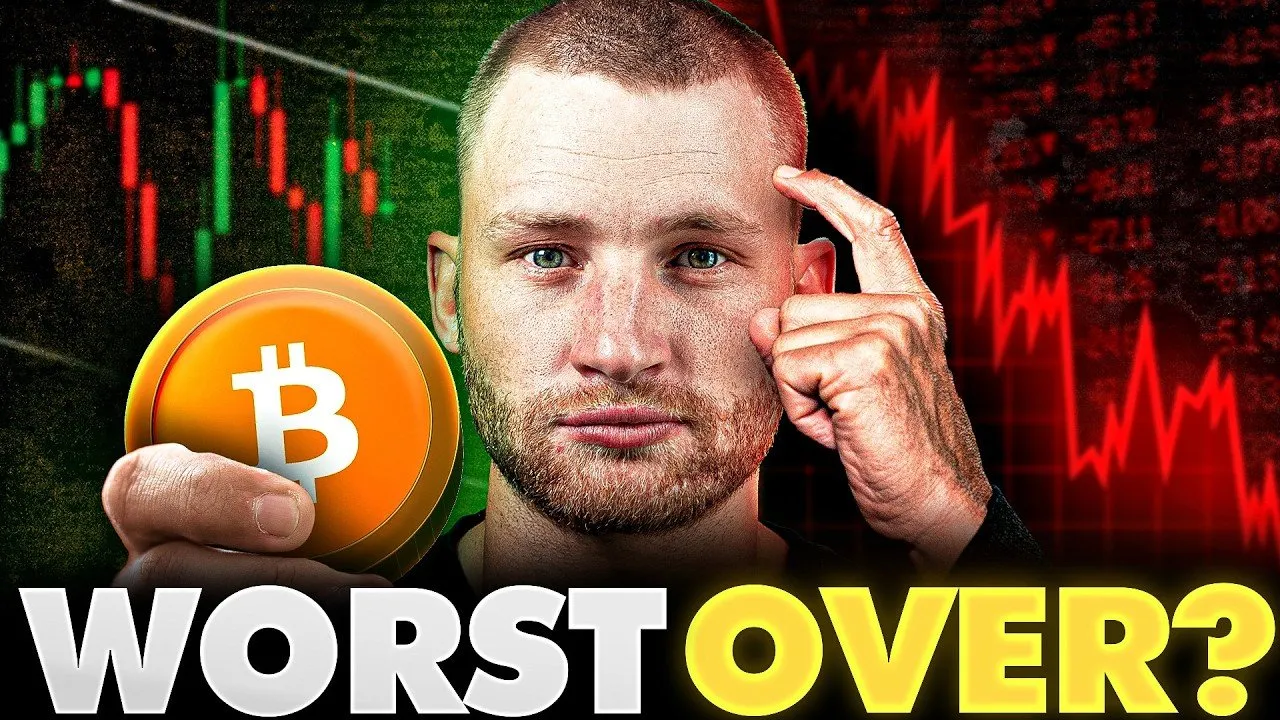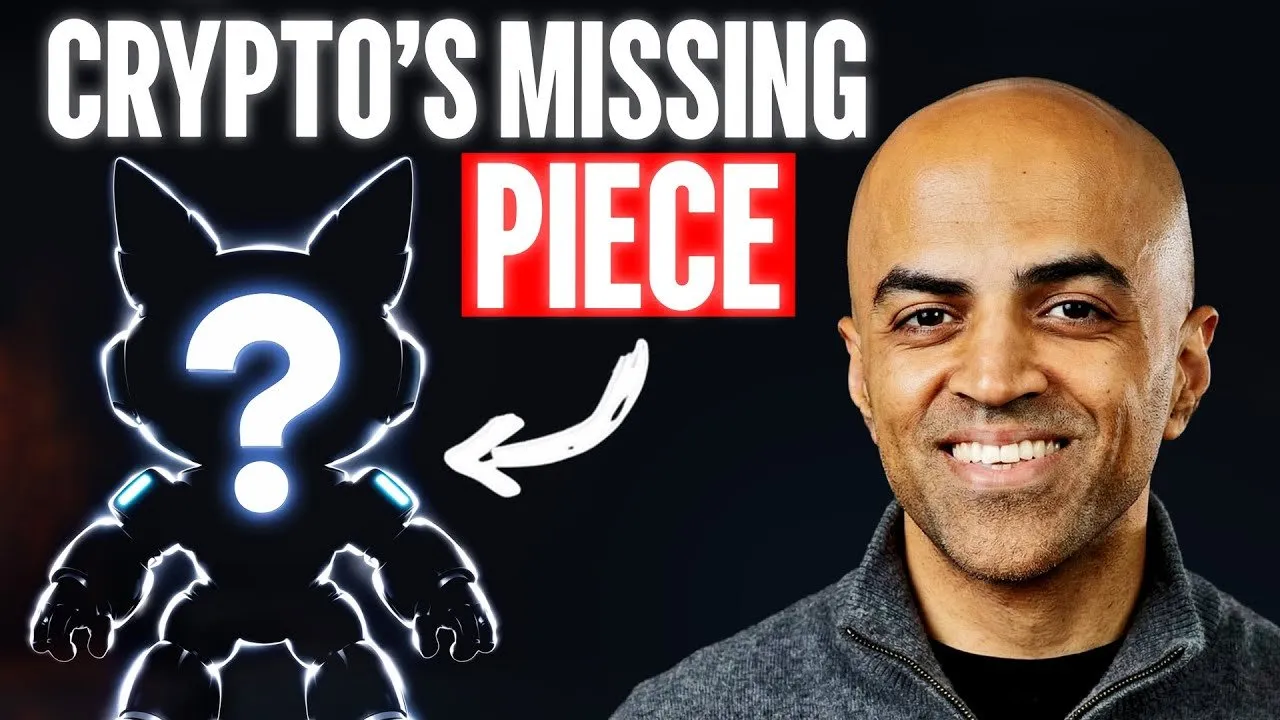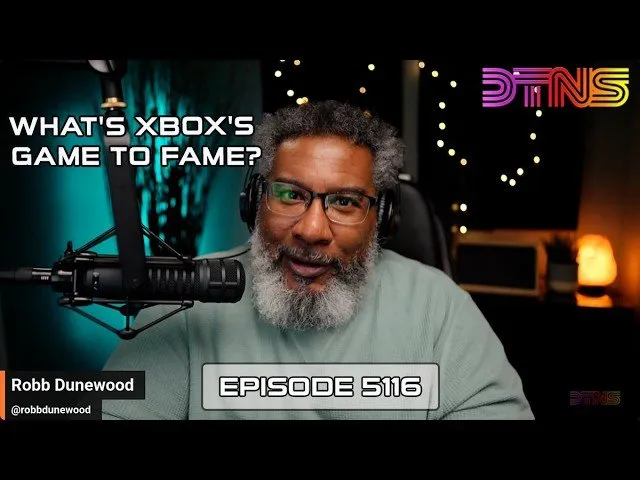Table of Contents
The remarkable story of Ray Kroc's transformation from struggling salesman to McDonald's founder, revealing the business model innovation that created a global empire.
Key Takeaways
- Ray Kroc maintained an obsessive work ethic from childhood, working 19-hour days while selling paper cups and playing piano
- He discovered McDonald's at age 52 while investigating why the McDonald Brothers needed eight milkshake mixers at one location
- The revolutionary insight was shifting from hamburger sales (1.4% commission) to real estate ownership and leasing back to franchisees
- Harry Sonborn's real estate strategy provided steady upfront revenue and capital for expansion, transforming McDonald's growth trajectory
- Kroc bought out the McDonald Brothers for $2.7 million, eliminating the 0.5% royalty that would have cost $15 million annually by 1977
- He treated McDonald's as a religion, prioritizing business expansion over all personal relationships including family
- His relentless pursuit of uniformity and perfection in every detail became McDonald's competitive advantage
- Advertising was viewed as investment rather than expense, driving explosive growth in key markets like California
- By 1977, McDonald's had grown to 4,000 locations with systemwide sales exceeding $3 billion annually
Timeline Overview
- 00:00–18:30 — Early Life and Obsessive Work Ethic: Growing up with entrepreneurial dreams, dropping out of high school to serve in WWI alongside Walt Disney, working 19-hour days selling paper cups and playing piano to support family
- 18:31–32:45 — Florida Real Estate Adventure and Father's Tragedy: Attempting real estate sales during 1920s boom, working for gangsters at illegal nightclub, getting arrested, father's death from stress after real estate speculation bubble burst
- 32:46–48:20 — Paper Cup Career and Multimixer Discovery: 17 years selling paper cups, jumping to multimixer sales with Earl Prince, mortgaging house to buy out terrible partnership deal, building foundation for future success
- 48:21–01:05:15 — Discovering McDonald's and the Brothers: Flying to California to investigate why McDonald Brothers needed eight multimixers, being amazed by efficiency and simplicity, signing franchise agreement at age 52 despite wife's objections
- 01:05:16–01:22:40 — Building the First Stores and Harry Sonborn: Opening first McDonald's while still selling multimixers, maintaining perfectionist standards, meeting Harry Sonborn who would revolutionize the business model
- 01:22:41–01:38:25 — The Real Estate Revolution: Harry's insight that McDonald's was in real estate business not burger business, owning land and leasing back to franchisees, accessing institutional investor capital for massive expansion
- 01:38:26–01:52:10 — Conflicts with McDonald Brothers and Buyout: Fighting over advertising investments and expansion pace, raising $2.7 million from "12 apostles" to buy out brothers, eliminating costly royalty payments
- 01:52:11–02:05:30 — Personal Sacrifices and Religious Devotion: Destroying marriages and family relationships for business, viewing McDonald's as religion, firing loyal employees including Harry and June, pursuing relentless expansion until death
The Foundation: Relentless Work Ethic and Early Entrepreneurship
- Ray Kroc's extraordinary work ethic manifested from childhood, earning him the nickname "Danny Dreamer" for his constant schemes and business ideas. Unlike typical dreamers, his visions were "invariably linked to some form of action"—when he dreamed about having a lemonade stand, he immediately set up a lemonade stand and worked hard to sell lemonade successfully.
- During World War I, Kroc dropped out of high school and lied about his age to join the Red Cross as an ambulance driver. His company included another fellow who had lied about his age—Walt Disney, who was considered a "strange duck" because while others chased girls during time off, Disney stayed in camp drawing pictures. This early connection with Disney foreshadowed Kroc's later ability to recognize and work with exceptional talent.
- After the war, Kroc refused to return to school and began his career as a salesman, establishing a punishing schedule that would characterize his entire professional life. He sold paper cups from 7:00 AM to 5:30 PM, then played piano at a radio station from 6:00 PM to 8:00 PM, took a two-hour break, then returned to work until 2:00 AM. This schedule continued almost seven days a week, with only Sunday afternoons off from cup sales.
- His early marriage to Ethel suffered under this relentless work schedule, but Kroc was unapologetic about his priorities. "I was driven by ambition. I was determined to live well and have nice things, and we could do so with the income from my two jobs." This philosophy—that work was his number one priority throughout his entire life—would remain consistent until his death.
- A crucial learning experience came during the Florida real estate boom of the mid-1920s. Kroc convinced his paper cup company bosses to let him work in Florida during Chicago's slow winter months. He cleverly targeted tourists from the Chicago area through the Miami Chamber of Commerce, calling them "as one Chicagoan to another" about exciting development opportunities. However, his timing was disastrous—just as he was gaining momentum, the entire real estate market collapsed.
- The Florida experience taught Kroc valuable lessons about focus and risk management. After working for gangsters at an illegal nightclub called The Silent Night and eventually getting arrested when federal agents raided the establishment, he returned to Chicago with a new philosophy: "I vowed that this was going to be my only job. I was going to make my living at it and to hell with moonlighting of any kind. I intended to devote every ounce of my energy to selling."
Personal Tragedy and the Drive for Security
- The most formative experience of Kroc's early life was witnessing his father's death from financial stress during the Great Depression. His father had been a conservative, principled man who began speculating in real estate during the boom years. With properties selling for $6,000 and quickly flipping for $18,000, his father confused luck with skill and held on too long when the market peaked.
- When the real estate bubble burst, Kroc's father was "crushed beneath a pile of deeds he could not sell—the land was worth less than he owed." This became "an unbearable situation for a man of my father's principled conservatism." The stress literally killed him—he died of a cerebral hemorrhage in 1930, having "worried himself to death." On the day he died, there were two pieces of paper: his last paycheck and a garnishment notice for the entire amount.
- This tragedy deeply influenced Kroc's psychopathic drive for financial success and security. Even after achieving great wealth later in life, he maintained the same relentless drive to keep doing more. Understanding how his father's life ended—destroyed by financial speculation and stress—explains Kroc's lifelong obsession with building sustainable, systematized business success rather than relying on speculation or luck.
- The experience taught Kroc that financial security couldn't come from gambling or speculation but only through hard work, systematic processes, and relentless attention to detail. This philosophy would later manifest in McDonald's obsessive focus on standardization, quality control, and systematic expansion rather than leaving success to chance or individual operator discretion.
- Kroc's father's story became embedded in his son's approach to business. Where his father had failed due to lack of systems and overreliance on luck, Kroc would succeed by creating bulletproof systems, maintaining control, and never allowing emotion or speculation to override systematic business principles. The trauma of his father's death created the psychological foundation for McDonald's legendary operational discipline.
- This background explains why Kroc was willing to mortgage his house multiple times throughout his career to fund business opportunities. Having seen his father destroyed by financial insecurity, Kroc was willing to take calculated risks with his own money when he believed in systematic business opportunities, but he would never allow his companies to operate without disciplined systems and controls.
The Multimixer Years and Business Model Innovation
- After 17 years of selling paper cups, Kroc discovered the multimixer through his customer Earl Prince, who had invented the device that made high-volume milkshake production possible. This invention "changed the course of my life" because it represented a superior product in a growing market—the explosion of soda fountains and milkshake parlors following Prohibition created massive demand for efficient milkshake equipment.
- When Prince offered Kroc the opportunity to leave his paper cup job and sell multimixers on a profit-sharing basis, Kroc's wife Ethel was incredulous: "You are risking your whole future if you do this. You are 35 years old and you're going to start all over again as if you were 20. What if the multimixer turns out to just be a fad and fails?" Kroc's response revealed his decision-making philosophy: "You have to trust my instincts on this. I'm positive that this is going to be a winner."
- The multimixer opportunity taught Kroc important lessons about bad business deals and the importance of equity ownership. His original agreement gave his paper cup company 60% of his new venture in exchange for the multimixer contract and $6,000 in startup capital. After two years of doing all the work, they demanded $68,000 for their 60% stake—more than 11 times their original investment while Kroc had built the entire business.
- Kroc's willingness to mortgage his house to buy out bad partners became a recurring theme. "I didn't know where the hell I was going to raise that money, but I had made up my mind to do it. In the end, most of the cash came from my new home. I managed to get an increase in the mortgage, much to Ethel's dismay." This experience taught him that maintaining control and ownership was worth significant personal financial risk.
- During his multimixer years, Kroc learned that even good products could be in declining industries. By the early 1950s, he realized he was "in a dwindling business" as restaurants and soda fountains downsized or eliminated milkshake sales entirely. This market insight forced him to seek new opportunities: "I knew that I had to find a new product" or face declining revenues despite having a superior product.
- The multimixer business prepared Kroc for McDonald's in crucial ways. He had learned to evaluate business opportunities, finance expansion through creative means, buy out problematic partners, and recognize when market conditions required pivoting to new opportunities. Most importantly, he had learned that systematic processes and superior products could create significant competitive advantages, but only if properly scaled and controlled.
Discovering McDonald's: The Perfect System
- Kroc's discovery of McDonald's came through investigating why the McDonald Brothers needed eight multimixers for one location—an unprecedented number that created a "mental picture of eight multimixers turning out 40 shakes at one time [that] was just too much to be believed." When he flew to California to investigate personally, he found "something was definitely happening here" as cars arrived and lines formed with "people marching up to the window and back to their cars with bags full of hamburgers."
- The McDonald Brothers' operation impressed Kroc with its systematic approach to simplification: "Each step in producing the limited menu was stripped down to its essence and accomplished with a minimum of effort." This represented "a restaurant stripped down to the minimum in service and menu," allowing the McDonalds to "concentrate on quality in every step." The key insight was "make every detail perfect and limit the number of details to perfect."
- Kroc immediately recognized the scalability potential that the McDonald Brothers themselves couldn't see. When he suggested opening "a series of restaurants like this," they responded with indifference: "We don't need any more problems. We're in a position to enjoy life now and that's just what we intend to do." Their contentment with the status quo was "utterly foreign to my thinking," revealing the fundamental difference between operators and empire builders.
- The franchise agreement Kroc signed contained crucial mistakes that would haunt him for years. Acting as his own attorney, he agreed to follow McDonald Brothers' plans "down to the last detail" and could not "deviate from their plans in my units unless the changes were spelled out in writing and then signed by both brothers and sent to me by registered mail." This seemingly innocuous requirement created massive operational problems later.
- Financially, the original deal gave Kroc just 1.9% of gross sales from franchises, with half a percent going to the McDonald Brothers, leaving him with only 1.4% of a 15-cent hamburger operation. Harry Sonborn would later observe, "You don't build an empire off of 1.4% of a 15-cent hamburger," but Kroc initially viewed McDonald's primarily as a vehicle for selling more multimixers rather than understanding its true potential.
- Kroc's decision to pursue McDonald's despite his wife's objections revealed his belief in systematic business opportunities over personal comfort. "Ethel was incensed by the whole thing," but Kroc had "no time to bother with emotional stress. I had to find a site for my first McDonald's store and start building." This prioritization of business opportunity over family harmony became a defining characteristic of his career.
Harry Sonborn and the Real Estate Revolution
- The most important person in McDonald's history besides Ray Kroc was Harry Sonborn, whose real estate insight transformed McDonald's from a struggling franchise operation into a financial powerhouse. Sonborn's revolutionary observation was: "You don't see to realize what business you're in. You're not in the burger business, you're in the real estate business. You don't build an empire off of a 1.4% cut of a 15-cent hamburger. You build it by owning the land upon which that burger is cooked."
- Sonborn's strategy provided McDonald's with two critical advantages they previously lacked. First, "a steady upfront revenue stream—money flows in before the first stake is in the ground." Second, "greater capital for expansion, which in turn fuels further land acquisition, which in turn fuels further expansion." This created a self-reinforcing cycle that enabled McDonald's explosive growth from dozens to thousands of locations.
- The real estate model solved McDonald's fundamental financing problem. Previously, when Kroc sought expansion loans, banks would ask what assets secured the loans. His answer—contracts giving him 1.4% of hamburger sales—provided insufficient collateral for significant lending. By owning real estate and leasing it back to franchisees, McDonald's suddenly had substantial assets that attracted institutional investors like life insurance companies.
- Harry's vision matched Kroc's in terms of scale and ambition. When Dick McDonald asked Harry about McDonald's future, "Harry told him that one day this company would be bigger than F.W. Woolworth"—one of America's largest retail chains at the time. Dick McDonald's response was telling: "I thought you had a genuine nut on your hands, Ray," but Harry "knew exactly where he wanted to go and he knew how to get there."
- The formation of Franchise Realty Corporation represented what Kroc called "a stroke of financing genius." This separate entity bought land, developed restaurants, and leased them back to franchisees, providing McDonald's with both development control and steady rental income. Kroc supported this innovation by "going into hock for everything I had—my house, my car, you name it," demonstrating his willingness to bet everything on systematic business innovations.
- The real estate strategy's success was evident in McDonald's rapid scaling from regional operation to national powerhouse. By owning the land beneath each restaurant, McDonald's gained unprecedented control over franchise operations, standardization, and expansion financing. This model became the template for modern franchise operations and demonstrated how business model innovation could be more valuable than product innovation.
Buying Out the McDonald Brothers and Gaining Control
- The partnership between Kroc and the McDonald Brothers deteriorated over fundamental philosophical differences about growth and investment. While Kroc was "obsessed with the idea of making McDonald's the biggest and best," the brothers "were content with what they had. They didn't want to be bothered with more risks and more demands." These opposing visions made conflict inevitable as McDonald's scaling opportunities became apparent.
- Advertising became a major flashpoint when Kroc requested that all franchisees contribute 1% of gross sales toward collective advertising campaigns. "We asked them to contribute 1% of their gross sales towards an advertising campaign that would benefit our stores and all of them as well, but they would have nothing to do with it." Kroc viewed advertising as investment while the brothers saw it as unnecessary expense.
- The contractual requirement for written approval of any operational changes became increasingly problematic as McDonald's needed to adapt to local conditions and improve operations. The brothers would "acknowledge the problems but refused to write a single letter that would permit me to make changes," creating a situation where "it was almost as though they were hoping I had failed"—despite their financial interest in Kroc's success.
- When Kroc finally asked the McDonald Brothers to name their buyout price, their response was shocking: "$2.7 million." Kroc's reaction was visceral—"I dropped the phone, my teeth and everything else. He asked me what that noise was and I told him that was me jumping out of the 20th floor of the office." This amount represented far more than Kroc could personally finance, requiring creative financial engineering.
- The solution came through "the 12 apostles"—a group of educational and charitable institutions including Princeton University, Howard University, Carnegie Tech, and the Ford Foundation. These institutions lent McDonald's the $2.7 million to buy out the McDonald Brothers in exchange for the brothers' half-percent royalty on all McDonald's gross sales. This deal transformed the institutions into major McDonald's stakeholders.
- The buyout's long-term value became staggering as McDonald's grew. The 12 apostles made $12 million on their $2.7 million investment, but the real benefit went to McDonald's itself. By 1977, with systemwide sales exceeding $3 billion, that half-percent royalty would have cost McDonald's $15 million annually. Over time, eliminating this royalty saved hundreds of millions of dollars that could be reinvested in expansion and operations.
McDonald's as Religion: The Psychology of Obsessive Success
- Kroc's relationship with McDonald's transcended normal business commitment and became what he explicitly called a religion. "I've often said that I believe in God, family, and McDonald's—and in the office, the order is reversed." This religious devotion explains his willingness to sacrifice personal relationships, fire loyal employees, and maintain relentless expansion pace regardless of personal cost.
- The religious metaphor appeared repeatedly in Kroc's language and thinking. He spoke of having "faith in McDonald's" and described his mental snapshots of the company's growth as "not nostalgia, but reaffirmation of my faith in McDonald's. I speak of faith in McDonald's as if it were a religion. That is exactly the way I think about it." This psychological framework justified extreme decisions in service of the company's mission.
- Kroc's perfectionism stemmed from viewing McDonald's operations as sacred rather than merely commercial. When franchisees failed to turn on signs at dusk or left litter in parking lots, "those little things didn't seem to bother some people, but they were gross affronts to me. I'd get screaming mad and really let Ed have it." His justification was simple: "Perfection is very difficult to achieve, and perfection was what I wanted in McDonald's. Everything else was secondary."
- The religious framework enabled Kroc to make ruthless personnel decisions that would otherwise seem cruel or ungrateful. When he fired Harry Sonborn and June Martino—both crucial to McDonald's early success—he justified these actions as necessary for the company's continued growth. Anyone who didn't share his vision for constant expansion became, in his mind, an obstacle to McDonald's mission.
- Kroc's demand for absolute commitment from employees reflected his religious approach to business. He convinced Harry and June to work so intensively that "both of them were neglecting their family obligations completely." June "never made it to one of their birthday parties or graduation ceremonies" for her two boys. When he later fired these same people, the tragic irony was that they had sacrificed their families for a leader who ultimately viewed them as expendable.
- Even in his final years, Kroc's religious devotion to McDonald's never wavered. "Even in the last few years when he was confined to a wheelchair, he still went to the office every day." Death was the only force that could separate Ray Kroc from his daily work at McDonald's, demonstrating that his commitment was indeed religious rather than merely professional or financial.
Personal Relationships: The Cost of Absolute Business Commitment
- Kroc's first marriage to Ethel dissolved primarily due to his unwillingness to compromise his business ambitions for family harmony. When he decided to pursue McDonald's, "Ethel was incensed by the whole thing," but Kroc "had no time to bother with emotional stress." His response revealed his priorities: "I had to find a site for my first McDonald's store and start building." Business opportunity always trumped personal relationships.
- The pattern of romantic obsession alongside business obsession characterized Kroc's personal life throughout his career. While building McDonald's, he became fixated on Joan, a franchisee's wife, leading to "long telephone conversations between Joan and me. I would be tingling with pleasure from head to toe when I hung up the receiver." This attraction motivated his divorce from Ethel, though Joan initially refused to leave her husband.
- Kroc's impulsive approach to marriage reflected the same all-or-nothing mentality he applied to business decisions. After Joan rejected him, "I fell so hard for Jane" (John Wayne's secretary) that "we had dinner together the night after we met and the next night and the night after that. We had dinner together five nights in a row. I was enchanted. Within two weeks we were married." This pattern of intense, rapid commitment characterized both his business and personal relationships.
- The irony of Kroc's personal life was that despite achieving enormous business success, he remained emotionally unfulfilled until reuniting with Joan years later. Even after becoming wealthy and successful, "the undeniable fact was that I was miserable" because "I could not get her out of my heart." His confession that "some people are bachelors by nature. I am not. I guess I need to be married to feel complete" revealed the personal cost of his business obsession.
- When Kroc finally reunited with Joan at a convention five years later, his actions demonstrated the same ruthless pursuit he applied to business opportunities. Despite being married to Jane and Joan being married to her husband, Kroc orchestrated their seating arrangement and made his intentions clear: "When I made my after-dinner speech about how I had attained all I had ever wanted in life except for one thing, little did they suspect that the missing element was sitting there at the very table beside me."
- Kroc's third marriage to Joan represented his only successful personal relationship, precisely because it came after he had achieved his primary business objectives and could finally "take life a little easier and enjoy it." However, even this happiness couldn't overcome his fundamental nature—despite claiming to be "finished grinding it out," he immediately contradicted himself: "I wasn't about to let it happen to me" and continued pursuing expansion until his death.
Kroc's story reveals the extraordinary achievements possible through absolute commitment to systematic business building, while simultaneously demonstrating the personal costs of viewing business success as more important than family relationships, personal health, and human connections. His legacy lies not in creating a better hamburger, but in proving that superior business systems and relentless execution could transform a simple product into a global empire worth billions of dollars.

